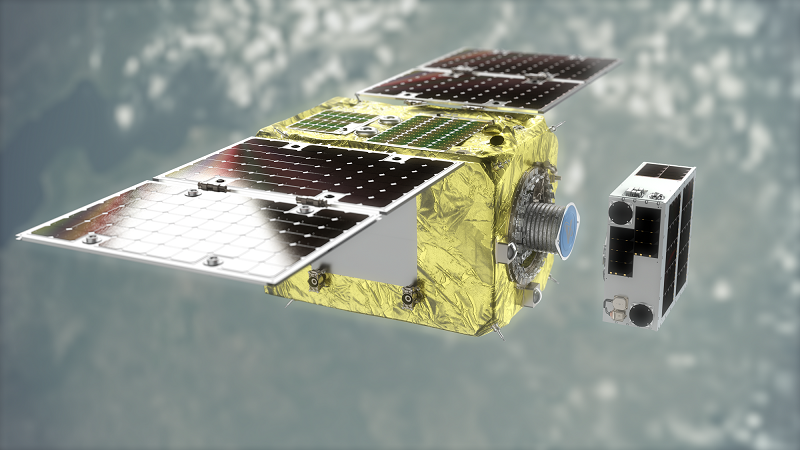
Astroscale UK controls ELSA-d Mission from Harwell Campus to Demonstrate Space Debris Removal
March 17th, 2021 – Astroscale Holdings Inc. (“Astroscale”), the market leader in satellite servicing and long-term orbital sustainability across all orbits, will launch its End-of-Life Services by Astroscale demonstration (ELSA-d) satellite from the Baikonur Cosmodrome in Kazakhstan this Saturday, March 20th at 6:07 am (London, UK time). ELSA-d will launch on a Soyuz rocket operated by GK Launch Services.
The ELSA-d launch marks the world’s first commercial mission to demonstrate the core technologies and capabilities necessary for space debris docking and removal. It also presents a major opportunity to expand in-orbit services in the UK and deliver Astroscale’s vision of a safe and sustainable space for the benefit of future generations.
The ELSA-d mission will be controlled by Astroscale UK and will be operated from the In-Orbit Servicing and Control Centre at the Satellite Applications Catapult (SAC) at Harwell Campus, UK.
Nobu Okada, Astroscale’s Founder and CEO said,
“Pre-launch activities are successfully completed; ELSA-d is now integrated on the rocket and ready to demonstrate our debris removal technology and capabilities to the world.”
John Auburn, Managing Director of Astroscale UK and Group Chief Commercial Officer, adds, “Our team is very proud to have developed the mission control and ground systems for ELSA-d. We will perform complex manoeuvres to demonstrate the release and capture of this debris, with the first semi-autonomous robotic magnetic capture of a piece of debris, tumbling through space, using advanced software and autonomous control technology. This mission will prepare the way for Astroscale to scale-up our commercial debris removal services for satellite providers and government partners. We hope to continue to leverage international partnerships and encourage investment in this innovative sector in the UK, providing us with further opportunities to drive forward the technology, capability and regulation needed for a burgeoning debris removal market.’
Amanda Solloway, UK Science Minister said “The removal of hazardous space debris is not only environmentally important but is also a huge commercial opportunity for the UK, with companies like Astroscale leading the way in demonstrating how we can make space safer for everyone. I am proud the UK Government not only helped make this mission a reality but is Europe’s largest investor in helping with space clean-up. As we build back better, we will continue to drive growth by investing in the technologies that have made today’s breakthrough possible.”
Dr Alice Bunn, International Director at the UK Space Agency adds, “A collision with debris in space could have a major impact on the many satellite services we rely on every day on Earth, from mobile phones to online banking. The UK is taking a leading role in international efforts to clean up space debris as the largest investor in space safety for the European Space Agency. Astroscale’s exciting ELSA-d mission is the world’s first commercial demonstration debris removal mission and will show how we can make space safer for everyone.”
Lucy Edge, Chief Operating Officer from the Satellite Applications Catapult said, “We’re delighted Astroscale’s ELSA-d mission will be the very first mission to use the new In-Orbit Servicing and Control Centre at our facility in Harwell. This milestone mission provides an impetus for future UK-led missions at this upgraded facility, which is open to all space-sector organisations, and an opportunity for the UK space industry to take the lead in the in-orbit servicing and manufacturing sector.”
Andrew Tyrer, Challenge Director of the Robots for a Safer World challenge at UK Research and Innovation (UKRI) adds, “I am truly excited and humbled at the rapid progress made for the ELSA-d mission. A successful world-first active debris removal mission demonstrates another high-profile example of the UK’s growing strength in Robotics in Extreme and Hazardous Environments. The experience gained during the ELSA-d mission will be invaluable and we look forward to the Satellite Applications Catapult’s In-Orbit Satellite Servicing and Control Centre at Harwell Campus being used for other exciting opportunities in the future.”
John Auburn, Managing Director of Astroscale UK and Group Chief Commercial Officer, concludes, “Now is the time to take the threat of debris seriously by committing to debris removal programmes and preparing satellites for future removal at their end of life. Avoiding catastrophic collisions will help to protect the space ecosystem and ensure all orbits can continue to thrive sustainably for generations to come.”